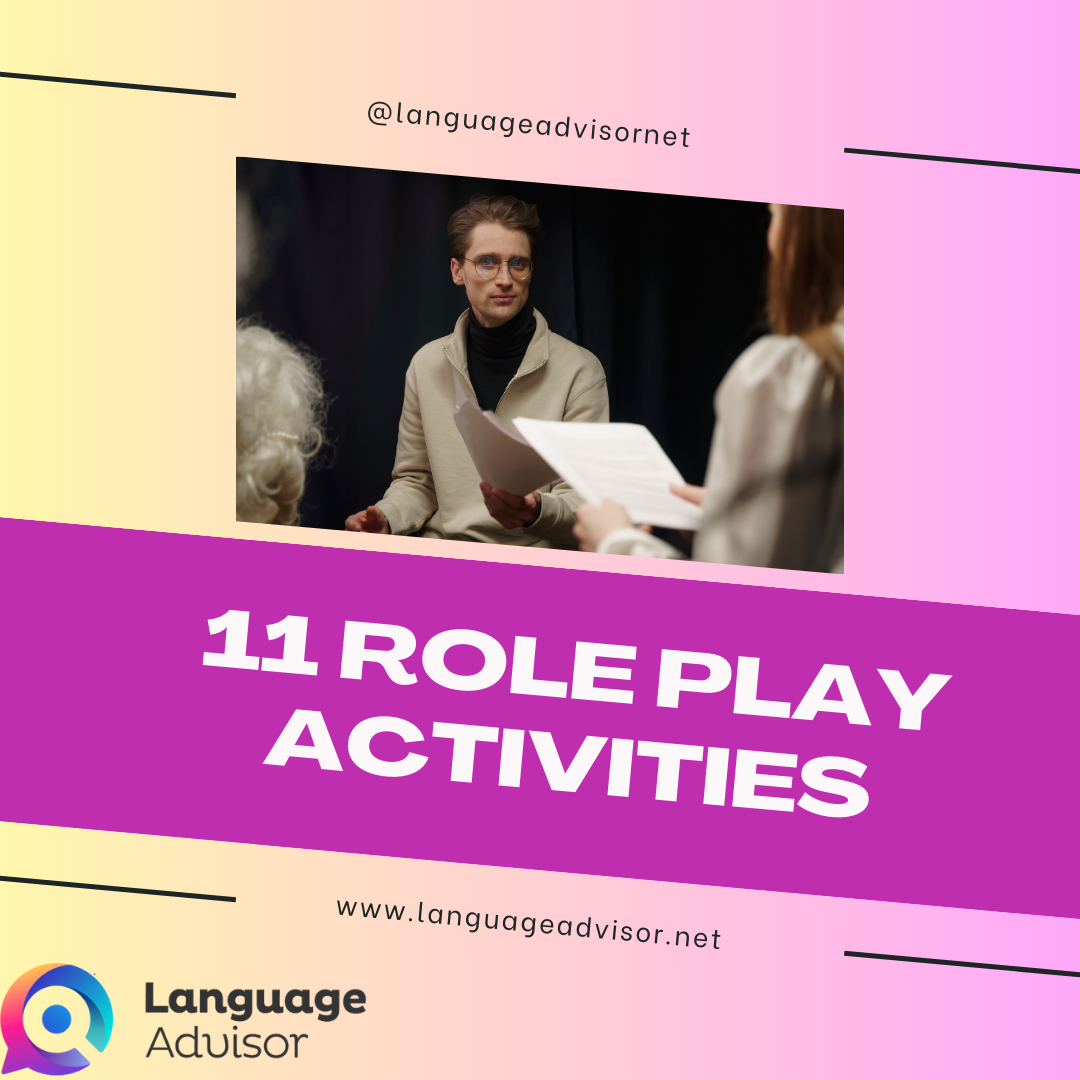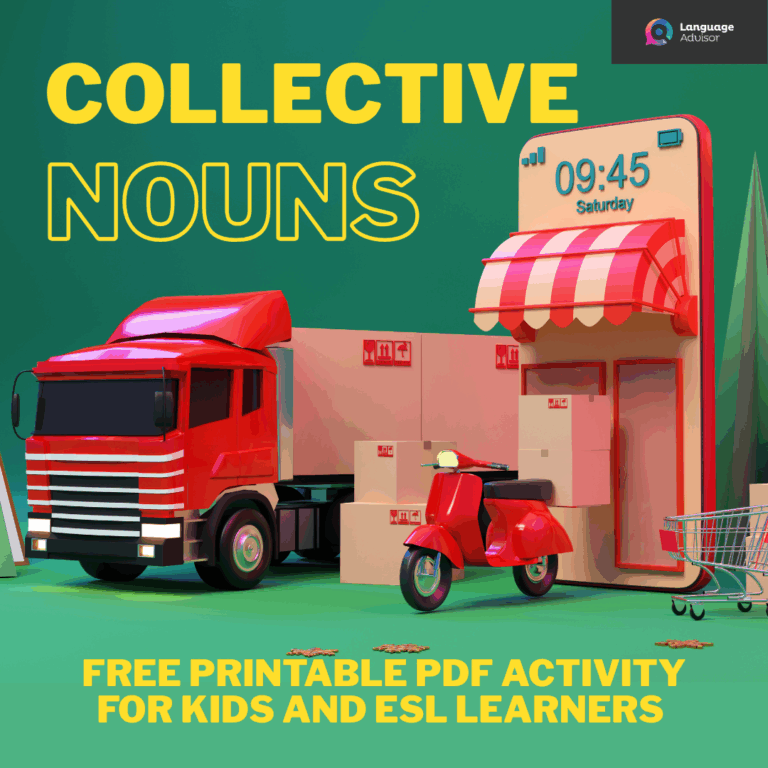11 Role Play Activities. Communicative Activities and Games for Learning English
11 Role Play Activities

11 Role Play Activities
11 Role Play Activities. Coming from a variety of teacher resource books, the activities listed in these pages are designed to foster communication through high-interest and motivational tasks. Each of these activities provides the crucial opportunity for practice that is so essential to the successful acquisition of a foreign language.

This is my elbow
Demonstrate with one student in front of the class. Touch your ear and say “this is my nose,” the student should respond by touching his/her nose and saying “this is my ear.” The student then points to his/her elbow and says “this is my foot,” the teacher responds by pointing to his/her foot and saying “this is my elbow.” Instruct the students to get into pairs and continue in this way. This is a lot of fun and there is typically a lot of laughter. It is appropriate for high beginners to low-intermediate level students – it is not as easy as it appears, it requires good listening skills and concentration and it is an interesting alternative to “Simon Says” to reinforce body part vocabulary.
From More Recipes for Tired Teachers by Christopher Sion

Narrator/Sound Effects/Actors
Have students act out any story, poem, song or dialogue from their textbook by getting into small groups (4-5 students). After preparing their “play”, the group comes to the front of the class. One student narrates the activity while another student makes sound effects and the others act it out. e.g. On a windy day (sound effects: howling wind), a boy walked (sound effects: the sound of stomping feet) into the house (actor: acts out the narration). The narrator can prompt speech from the actors by saying “and then the boy said …” This can be a refreshing way to go over rote and dry dialogue material and make it more fun and interesting, it’s also a fun way for students to play with songs and poetry.
From 101 Communicative Games for the English Classroom by Cyndi Turtledove

Charades
Although this is an old and well-established party game, don’t underestimate its tremendous potential in the EFL classroom. This is a super activity for reinforcing vocabulary and breaking down barriers and inhibitions to create a supportive, risk-taking atmosphere. The students can choose to write titles of books, movies, songs or you can use a list of previously learned proverbs or idioms. One member from team A acts out the sentence on his card (a card that was created by the other team or by the teacher. His/her teammates try to guess what is written on the card, one word at a time with hand signals and pantomime. If the team guesses correctly in a specified period of time (1-2 minutes) they win a point.
A variation on this is the game of Pictionary, which does not require a formal game board for play. Students can be given words to draw for their teammates and win points for their team for correct guesses. Pictionary is really super for reinforcing recently learned vocabulary.

Lost Voices
This is another variation on the charades-pantomime theme but I mention it because it’s really great. Prepare situations on slips of paper. A student comes to the front of the room and selects a piece of paper. He is told that he has lost his voice and he must convey the situation on the paper to the class without speaking. The students can make guesses and ask questions and the student acting out the situation can shake or nod his head to acknowledge incorrect/correct guesses. First tell the class what the situation is and then the student acts out the specific information relating to that situation: e.g. 1. You are coming in late to class, convey the following to your teacher: I’m sorry I’m late but I overslept; 2. You are in a grocery store in a foreign country and cannot read the language, convey this to the clerk: I need to buy some pepper and I don’t know where to find it; 3. Tell the police the following: I’ve lost my dog, he’s a Great Dane and has his name on his collar; or I’ve been robbed, I was walking down the street and 2 men took my purse; 4. Tell the hotel clerk that the phone in your room doesn’t work, etc., etc. The teacher should act out a few of these for the class before the game begins, to make sure that the students understand.
From Language Teaching Games and Contests by W.R. Lee
11 Role Play Activities

Mime Continuation
Make up a list of sentences that start with “You are going
to…; or You are about to… (e.g. drive a car, wash your face, drink a cup of tea, go swimming, fall asleep, paint a picture, etc.) Divide students into two teams. One person from each team comes to the front of the class and together they select a paper from a bag. Then, at the same time, each person stands before their team and acts out what they are about to do, WITHOUT demonstrating the actual action. e.g. for “going to wash your face” the student might mime standing before a mirror, turning on water, picking up a towel, rinsing the towel and putting soap on, raising the towel to his face, etc. The two students do not have to mime the same actions, they are working independently trying to get each of their teams to guess the right answer first. The first team to get it right gets a point. This activity works best with intermediate+ students. For lower level students simply adapt the activity to have them mime the actual action (washing their faces).
From Grammar Practice Activities by Penny Ur

Acting Out Proverbs
This is yet another variation on this theme and one that requires higher level language skills. A significant difference over charades and lost voices is the fact that students must speak when acting out the proverbs. Each team selects a proverb (the teacher can write proverbs on cards to be given to the teams or a list can be prepared and teams can choose) The team decides how to act out the MEANING of the proverb NOT the literal sentence. e.g. “Out of the frying pan, into the fire” – might be acted out by showing a girl fighting with a boyfriend, then complaining to her sister and deciding to go out with another boy with whom she has a worse fight. She would then tell her sister “be careful, because you might get out of one bad situation and into a worse one.” The team guessing the proverb would call out “out of the frying pan, into the fire”. Other proverbs to consider: “A stitch in time, saves nine; A bird in the hand is worth two in the bush; Too many cooks spoil the broth; Absence makes the heart grow fonder; Out of sight, out of mind; The early bird get’s the worm; Don’t count your chickens before they are hatched; Don’t put all your eggs in one basket, etc.”
From 101 Communicative Games for the English Classroom by Cyndi Turtledove

What are they really thinking?
In small groups of 4, students improvise a conversation based on a situation task card they have been given by the teacher. Conversation Inspirations is a great resource for conversation topic ideas for such role plays. Player A and B sit facing each other having their conversation. Players C and D stand behind A and B and talk as the “minds” of each player. A suggested sequence would be: Player A speaks, Player C says what player A is really thinking, Player B responds to what player A has said and Player D says what Player A is really thinking. This is a great activity for a conversation between a teacher and student, boss and employee, customer and clerk, job interviewer and interviewee, neighbors, spouses, etc.
From 101 Communicative Games for the English Classroom by Cyndi Turtledove

Story in a Bag
This is an activity that often has extremely creative and very funny results. I have used it successfully with low-intermediate to advanced students. Each group of 3-4 people is given a bag containing 5 or 6 seemingly unrelated articles, e.g. a book, knife, a bottle of medicine, an envelope, a green handkerchief. Team members are given time to invent a story that incorporates all of these items. Each group can tell its story to the class – they can narrate it, use dialogue, pantomime/gestures, etc. The time for story prep will depend on the students, in some cases you may want to assign it as homework to be prepared for the next class, in other cases I have found that 15-30 minutes is sufficient for more advanced students to prepare amazing role plays.
From 101 Word Games by George P. McCallum

Acting with Comparatives and Superlatives
Students are arranged into groups of 3. Each group is given a word to act out as comparative/superlative and the rest of the class must figure out what word they are showing, e.g. funny, funnier, funniest; small, smaller, smallest; smart, smarter, smartest; happy, happier, happiest; etc., etc. This activity often has very funny results and the students really seem to enjoy it. It is often best to give the words to the groups in advance, giving everyone 10 minutes or so to plan how they will demonstrate, then call the whole class together.
From 101 Communicative Games for the English Classroom by Cyndi Turtledove
11 Role Play Activities

Acting with Adverbs
After studying adverbs a list is put up on the board: slowly, quickly, sadly, gladly, tiredly, enthusiastically, fearfully, angrily, hopefully, uncomfortably, etc. One student from each team is given adverb by the teacher (the same for both), the class is then told to choose an activity – walking, running, sitting, writing, turning around, etc. The student from each team then tries to convey the adverb by doing that activity accordingly, e.g. the adverb is “slowly” and the class selects the activity “sitting down.” Whichever team shouts out the correct adverb first gets a point.
Variation: One student goes out of the room. The class decides on an adverb. The student is brought back in and determines what the adverb is by asking other students to act it out, e.g. John walk that way, Mary open the door that way, etc.
From 101 Word Games by George P. McCallum

Area Focus
To reinforce the concept of the kind of dialogue that is specific to a place (to reinforce vocabulary associated with that place – e.g. doctor’s office, classroom, hotel, restaurant, train station, etc. Students are put into small groups and are asked to create a dialogue of what they might say in that place, e.g. at a restaurant a family might be deciding what to eat and asking questions of the waiter, or someone might be arguing over the amount on their bill or someone might spill food, etc. (You can provide them with specific task cards that present the scenario if they need extra support). Then the classroom is transformed into that restaurant or doctor’s office, etc. Each group is seated (or standing) around the room and everyone is acting out their role play simultaneously . When the teacher calls out “team A” then team A gets very loud in their acting and the other teams lower their voices to a whisper, but they are still acting out their role plays. Then call out “team B” and A starts whispering while team B speaks loudly. This is an excellent way to introduce students to the concept of role playing without self-consciousness and creates a real life environment showing that many things are happening in any given context simultaneously.
From 101 Communicative Games for the English Classroom by Cyndi Turtledove

11 Role Play Activities. Also check out these listening and speaking activities












